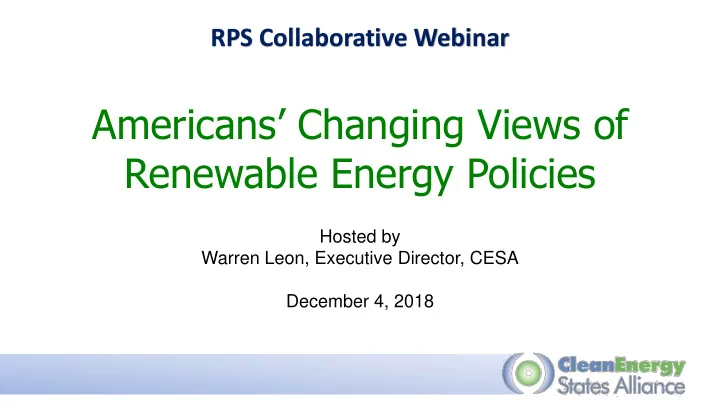

RPS Collaborative Webinar Americans’ Changing Views of Renewable Energy Policies Hosted by Warren Leon, Executive Director, CESA December 4, 2018
Housekeeping Join audio: • Choose Mic & Speakers to use VoIP • Choose Telephone and dial using the information provided Use the orange arrow to open and close your control panel Submit questions and comments via the Questions panel This webinar is being recorded. We will email you a webinar recording within 48 hours. CESA’s webinars are archived at www.cesa.org/webinars
www.cesa.org
RPS Collaborative • With funding from the Energy Foundation and the U.S. Department of Energy, CESA facilitates the Collaborative . • Includes state RPS administrators , federal agency representatives , and other stakeholders. • Advances dialogue and learning about RPS programs by examining the challenges and potential solutions for successful implementation of state RPS programs, including identification of best practices . • To sign up for the Collaborative listserv to get the monthly newsletter and announcements of upcoming events , see: www.cesa.org/projects/renewable-portfolio-standards
Webinar Speakers Sarah Mills , Senior Project Manager & Lecturer, Gerald R. Ford School of Public Policy, University of Michigan Warren Leon , Executive Director, Clean Energy States Alliance (moderator)
Americans’ Changing Views of Renewable Energy Policies Sarah Mills, PhD University of Michigan CESA Webinar – December 4, 2018
Outline Overview of NSEE • Findings from NSEE@10 Report • Latest findings from Fall 2018 • 2
National Surveys on Energy and Environment • Public opinion o Random sample of U.S. adult residents o Telephone interviews o Sample size: 700-1000 • Frequency: Fall of 2008, 2009, then twice per year • Covers climate belief and energy policy 3
National Surveys on Energy and Environment • Partnership between University of Michigan and Muhlenberg College’s Institute of Public Opinion o All funding to-date from these colleges • Committed to research transparency o Data tables, survey instruments online soon after survey o Full dataset available after initial reporting 4
NSEE @10 • In-depth reports pulling together all data from 10 years of NSEE surveys o Fossil fuels (Coal, Natural gas, Pipelines) o Federalism o Carbon pricing (Carbon tax, Cap-and-trade) o Transportation (Fuel economy, EV rebates, Gas taxes) o Renewables (Wind, Solar, RPS) – Released October 2018 o Adaptation, Mitigation, & Geoengineering o Attitudes about climate change 5
Consistently high support for requiring renewable energy (RPS) 6
Net support for RPS across political spectrum 7
Net support for RPS even among climate skeptics 8
No difference in net support based on RPS status 9
Most don’t know if state has RPS; more (incorrectly ) think don’t have RPS 10
Support for RPS drops once price applied 11
Drop in support once cost applied happens across political spectrum 12
Most willing to pay something more for renewable energy; growing portion say >$50/year 13
Democrats & Independents more willing to pay a premium (at least $100 per year) 14
Most think RPS will boost state economies Question Text: “State governments will boost their economies by requiring greater use of renewable energy.” 15
But RPS leadership increasingly seen as competitive disadvantage Question Text: “My state’s economy will be damaged if it requires greater use of RE while neighboring states don’t.” 16
Net agreement that RPS causes competitive disadvantage among Republicans, Independents 17
Apart from mandates, wide support for increasing wind, solar 18
Solar seen as more reliable than wind 19
Wind seen as job-creator more than climate solution 20
Summary • Wide support for renewables, slightly less for RPS (“mandate”) • Most don’t follow RPS policy closely • Most willing to pay modest amount for more renewables; growing portion willing to pay much more • Wide support likely due to non-climate benefits (e.g., job creation) o But mandates not necessarily seen as competitive advantage 21
Latest findings from Fall 2018 22
Large majorities of Americans of both parties support increasing the use of solar and wind energy in their state. 23
The gap between Democrats and Republicans is larger on state policies mandating or subsidizing renewable energy. 24
Democrats most likely to point to economic development, human health benefits of renewable energy. 25
Republicans point to energy independence, health benefits; not so much climate. 26
What Else Are We Working On? • NSEE reports on carbon pricing, geoengineering • How other state policies facilitate/hinder renewable energy (Renewable Energy Policy Initiative) Property taxation o Siting authority o Farmland preservation o Equity within RPS, solar policies o • How renewables impact host communities; how local governments plan for energy infrastructure 27
Thank you! Sarah Mills sbmills@umich.edu Web: www.closup.umich.edu/nsee Twitter: @CLOSUP
Thank you for attending our webinar Warren Leon RPS Project Director, CESA Executive Director wleon@cleanegroup.org Visit our website to learn more about the RPS Collaborative and to sign up for our e-newsletter: www.cesa.org/projects/renewable-portfolio-standards Find us online: www.cesa.org facebook.com/cleanenergystates @CESA_news on Twitter
Upcoming Webinars The Real Estate Industry and Selling Homes with Solar Tuesday, December 11, 1-2pm ET Oregon’s New Energy Storage Project for Resiliency and Cost Savings Tuesday, December 18, 2-3pm ET Read more and register at: www.cesa.org/webinars
Recommend
More recommend